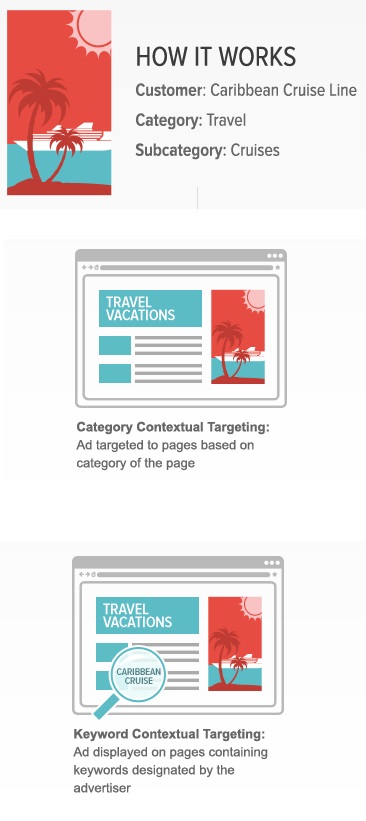The Insightful Media Series – Keyword Contextual Advertising
This week in the Insightful Media Series we take a look at Keyword Contextual Advertising and see how brands can increase the engagement for a campaign, find new customers and create affinity with consumers by advertising to them in the right context.
What is Keyword Contextual Advertising?
While many advertising online methods today rely on data built up from a user’s internet activity, keyword contextual advertising focuses instead on the web page the advert will be displayed on.
Contextual advertising places banners and links directly on pages with a strong contextual relationship to the advertiser’s product or services. In doing so, the intention is to target a website audience who are more likely to relate to the ad due to its contextual relationship with the web page’s content.
Unlike most other methods, contextual advertising does not require re-targeting or a keyword search to bring up the ad; it is there every time the page is viewed due to keyword relevance on the page. Keyword contextual advertising does not require cookies or user data.
 How Does Keyword Contextual Advertising Work?
How Does Keyword Contextual Advertising Work?
Contextual advertising is made possible when a web page contains ad code which fetches an ad from an ad server on the basis that the ad served is closely related to the subject matter of the web page.
Contextual advertising systems scan the page where the ad code is in place for keywords and phrases that have a direct connection to the product or service being sold, and then serve the appropriate ad.
For advertisers to gain position on a page, they define their desired audience by selecting keywords that match the interest and intent they associate with customers. They can bid on and further optimise their keyword choices to fine tune the relevance of their campaign and in so doing control how broadly or narrowly defined the pages will be where their ads appear.
In relation to the web page visitor, the advertising logic behind contextual advertising is that people are more likely to click on an ad and visit a product website, or even convert, where the ad appears in the correct context corresponding to an intent which is latent and clearly expressed.
Contextual advertising can be approached in two ways ‘linguistic’ and ‘non-linguistic’.
The main difference is that linguistic contextual looks at the syntax of keyword structures and can classify them into phrases. This is great for a localised approach to a campaign where certain phrases and slang words could be relevant.
The second approach, non-linguistic, looks at clusters of characters that show up with heightened frequency. This is very handy for common misspellings and acronyms. Both are very important as they lead to smarter advertising when categorising the relevance of a page for an advert.
What are the benefits of Keyword Contextual Advertising?
Increased Performance 
Keyword contextual advertising can increase campaign performance significantly. It is more likely that contextual advertisements will be clicked on by users looking for useful information on websites and who want further depth of knowledge. Any advertising connected to the page’s subject would increase the possibility that the user would buy the product while also ensuring brand exposure to a relevant audience.
The typical cycle for a person looking for a product online involves a general search, followed by a consideration phase where a person evaluates a product in relation to other alternatives and where they may draw on peer advice before settling on their desired product. Most people don’t convert immediately, rather they will do a final follow up search for the product they have identified as best meeting their needs before committing to purchase.
The point in the sales funnel where advertisers have the greatest potential to influence and persuade is at the second stage where product preferences are firmed up. Very often keyword contextual advertising helps brands achieve visibility in context where product comparison research and conversations are taking place.
A Grapeshot case study of a campaign that used keyword contextual advertising on 4% of its campaign found that it generated 22% of conversions for the advertiser. This shows just how effective and efficient contextual advertising can be.
Brand Awareness
Contextual advertising puts the ad in front of the inquisitive user on the webpage they are most interested in and in a highly relevant context. One survey by Crystal Semantics found 46% of people thought advertising displayed to them was unrelated and 81% would be more inclined to click through if it had been related to the page topic. The offshoots of this are that it can engage customers further and lead to a better customer experience and greater ultimate customer satisfaction.
Brand Safety
One major aspect of contextual advertising and using technologies such as Grapeshot, Crystal Semantics Integral Ad Science is enforcing brand safety. An advertiser does not want to see their brand appear on a page covering a negative story or a bizarrely unrelated topic due to a keyword miscommunication.
Keyword advertising systems can also prevent ads showing up in undesirable contexts thereby ensuring no harm comes to the brand name by excluding advertising on sites that show negative or toxic keywords.
New Customers
As keyword contextual advertising is not bound by a cookie pool, the campaign can scale and help companies find new customers. this expands the size of the target audience for an advertisers product or service without compromising to any great extent on shopper intent.
Vantagelocal saw a strong increase in CTR of over 200% and 300% in two campaign samples indicating new customer growth not regularly seen in other methods of online advertising.
Cost Effectiveness
Very often with PPC, head terms can be incredibly competitive and therefore expensive. Many companies can find themselves priced out and therefore invisible on the search engines. Keyword contextual advertising safeguards the intent quality associated with PPC but instead of being triggered by a keyword search, it is sprung by the presence of trigger keywords which define the interest or need.
The costs involved can be a fraction of what a brand would pay on the search engines. This form of advertising can compensate for lack of visibility due to budget constraints or alternatively lack of visibility due to inferior quality scores on the search engines. In this regard, it can drive very high levels of ROI.
How can Insightful Media Help you?
Insightful Media has a strong background in performance marketing and one of our specialist solutions is Keyword Contextual Advertising. We work with a number of leading platforms to help us identify interest and intent when it expresses itself in context.
To discuss Keyword Contextual Advertising options with Insightful Media, contact Lee on (01) 703 0406 or email lee@insightfulmedia.ie
Further Reading
Orphic Pixel:
The Benefits of Contextual Advertising for a Website
Grapeshot:
The Trade Desk Case Study
Crystal Semantics
Survey
Integral Ad Science:
Brand Safe Geo-Targeting
Vantage Local: Beyond Keywords:
The New Science of Contextual Ads
Brick Marketing:
Defining Contextual Advertising

